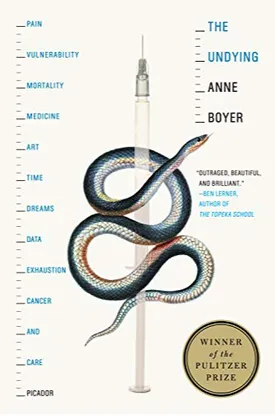The Undying: Pain, vulnerability, mortality, medicine, art, time, dreams, data, exhaustion, cancer, and care by Anne Boyer
Anne Boyer's The Undying paints a vivid, hard-hitting portrait of pain, vulnerability, mortality, medicine, art, time, dreams, data, exhaustion, cancer, and care. This sweeping collection of essays narrates a personal and cultural history of getting sick and living with illness through eye-opening prose.
At its heart, The Undying questions and challenges accepted notions of how we understand and affix meaning to individual suffering. Boyer weaves together a truly universal experience in how to approach, confront, and appreciate the presence of pain and its socio-political implications. In doing so, she crafts a necessary narrative of what it means to be human in the face of trauma that forces us to confront our mortality and liberate ourselves from systemic power.
Throughout the book, Boyer draws on personal history and philosophical insights to explore the complex terrain of illness. She examines the power dynamics of medicine and its failure to adequately address the needs of those living with illness. She takes us to her own fraught relationship with her body, being in and out of doctors’ offices and hospitals, and puts our complicated relationship with health care under the microscope. By breaking down the expectations and preconceived notions of illness, she encourages readers to explore their own understanding of what it might mean to have a health condition.
The essays within acknowledge the realities of living with an illness and examines how we can shape our relationship with our bodies to move towards a more expansive, empowering attitude. Boyer reflects on the language of sickness, how it affects those with and without illness, and how it is used to confront the clinical terms used by health professionals to describe the human condition. Alongside, she unfurls stories of hope, care, and courage, showcasing the strength of the human spirit that can persevere and retain hope even in times of anguish.
The Undying also brings us face to face with how technology has shaped how we approach pain: from datafication to questions of autonomy and surveillance. It is here that Boyer goes beyond what medicine alone can offer, exploring the possibilities of exploring new models of care, support, and solidarity between the sick and the vulnerable. Through this, the book offers radical new ways of seeing sickness, differently and more wholly.
The Undying is a powerful call to arms, urging us to pay attention to bodies of those living in pain, to seek out more compassionately informed understandings of illness and care, and to push back at the limited ways in which we treat illness. It is an inspiring reminder that the best way to confront our own mortality is to confront it with love, compassion, and curiosity.

